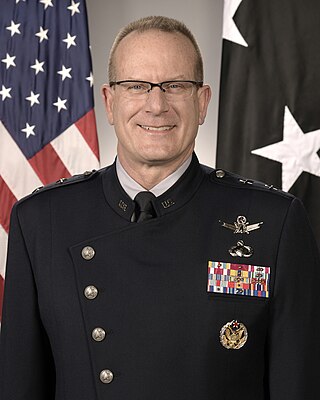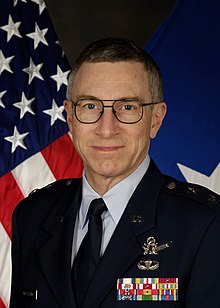UFO conspiracy theories are a subset of conspiracy theories which argue that various governments and politicians globally, in particular the United States government, are suppressing evidence that unidentified flying objects are controlled by a non-human intelligence or built using alien technology. Such conspiracy theories usually argue that Earth governments are in communication or cooperation with extraterrestrial visitors despite public disclaimers, and further that some of these theories claim that the governments are explicitly allowing alien abduction.

Kirtland Air Force Base is a United States Air Force base. It is located in the southeast quadrant of the Albuquerque, New Mexico, urban area, adjacent to the Albuquerque International Sunport. The base was named for the early Army aviator Col. Roy C. Kirtland. The military and the international airport share the same runways, making ABQ a joint civil-military airport.

The Air Force Research Laboratory (AFRL) is a scientific research and development detachment of the United States Air Force Materiel Command dedicated to leading the discovery, development, and integration of direct-energy based aerospace warfighting technologies, planning and executing the Air Force science and technology program, and providing warfighting capabilities to United States air, space, and cyberspace forces. It controls the entire Air Force science and technology research budget which was $2.4 billion in 2006.

The Air Force Materiel Command (AFMC) is a Major Command (MAJCOM) of the United States Air Force (USAF). AFMC was created on July 1, 1992, through the amalgamation of the former Air Force Logistics Command (AFLC) and the former Air Force Systems Command (AFSC).

General Lester L. Lyles is a retired four-star general in the United States Air Force (USAF). He served as Vice Chief of Staff of the United States Air Force, and Commander, Air Force Materiel Command, Wright-Patterson Air Force Base, Ohio. After retirement from the USAF in 2003, he became a company director for General Dynamics, DPL Inc., KBR, Inc., Precision Castparts Corp., MTC Technologies, Battelle Memorial Institute and USAA. Lyles is also a trustee of Analytic Services and a managing partner of Four Seasons Ventures, LLC.

Located at Kirtland Air Force Base, New Mexico, the Air Force Operational Test and Evaluation Center is a direct reporting unit of Headquarters, United States Air Force. It is the Air Force independent test agency responsible for testing, under operationally realistic conditions, new systems being developed for Air Force and multi-service use.

The 1st Space Operations Squadron is a United States Space Force unit responsible for space-based space domain awareness. Located at Schriever Space Force Base, Colorado, the squadron operates the Space Based Space Surveillance system, the Advanced Technology Risk Reduction system, the Operationally Responsive Space-5 satellite, and the Geosynchronous Space Situational Awareness Program.

Simon Peter Worden was Director of NASA's Ames Research Center (ARC) at Moffett Field, California, until his retirement on March 31, 2015. Prior to joining NASA, he held several positions in the United States Air Force and was research professor of astronomy at the University of Arizona, Tucson. He is a recognized expert on space issues – both civil and military. Worden has authored or co-authored more than 150 scientific papers in astrophysics, space sciences, and strategic studies. He served as a scientific co-investigator for two NASA space science missions, and received the NASA Outstanding Leadership Medal for the 1994 Clementine mission. He was named the 2009 Federal Laboratory Consortium Laboratory Director of the Year.

David Lee Goldfein is a retired United States Air Force four-star general who last served as the 21st Chief of Staff of the United States Air Force. He previously served as the vice chief of staff of the Air Force and, prior to that, he served as the director of the Joint Staff, a position within the Joint Chiefs of Staff who assists the chairman of the Joint Chiefs of Staff. Goldfein retired from the Air Force on October 1, 2020, after over 37 years of service.

Terrence John O'Shaughnessy is a retired United States Air Force four-star general who previously served as the commander of United States Northern Command and as the commander of North American Aerospace Defense Command.
The Advanced Aerospace Threat Identification Program (AATIP) was an unclassified but unpublicized investigatory effort funded by the United States Government to study unidentified flying objects (UFOs) or unexplained aerial phenomena (UAP). The program was first made public on December 16, 2017. The program began in 2007, with funding of $22 million over the five years until the available appropriations were ended in 2012. The program began in the U.S. Defense Intelligence Agency.

Luis Elizondo is a media personality and former U.S. Army Counterintelligence Special Agent and former employee of the Office of the Under Secretary of Defense for Intelligence.

To the Stars Incorporated, formerly known as To The Stars Academy of Arts & Sciences (TTSA), is a San Diego-based company co-founded by Tom DeLonge, Harold E. Puthoff (engineer), and Jim Semivan. The company, which is composed of aerospace, science, and entertainment divisions, has produced music recordings, books, television shows and films. A focus of the company is the promotion of UFOs and other fringe science.

John Ferdinand "JT" Thompson is a retired lieutenant general in the United States Air Force who last served as the commander of the Space and Missile Systems Center from May 2017 to July 2021. He entered the United States Air Force in 1984 as a graduate of the United States Air Force Academy.

The Pentagon UFO videos are selected visual recordings of FLIR targeting from United States Navy fighter jets based aboard aircraft carriers USS Nimitz and USS Theodore Roosevelt in 2004, 2014 and 2015, with additional footage taken by other Navy personnel in 2019. The four grainy, monochromic videos, widely characterized as officially documenting UAP, have received extensive coverage in the media since 2017. The Pentagon later addressed and officially released the first three videos of unidentified aerial phenomena (UAP) in 2020, and confirmed the provenance of the leaked 2019 videos in two statements made in 2021. Footage of UAP was also released in 2023, sourced from MQ9 military drones.

The All-domain Anomaly Resolution Office (AARO) is an office within the United States Office of the Secretary of Defense that investigates unidentified flying objects (UFOs) and other phenomena in the air, sea, and/or space and/or on land: sometimes referred to as "unidentified aerial phenomena" or "unidentified anomalous phenomena" (UAP). Its first director was physicist Sean Kirkpatrick, and its current acting director is Tim Phillips who reports to Deputy Defense Secretary Kathleen Hicks.

The United States Space Force is organized by different units: the Space Staff, the field commands, and the space deltas.

Steven P. Whitney is a United States Space Force major general who serves as the director of staff of the United States Space Force. He previously served as the military deputy to the assistant secretary of the Air Force for space acquisition and integration from 2021 to 2023.

Timothy Alan Sejba is a United States Space Force major general who serves as the commander of Space Training and Readiness Command. He previously served as the program executive officer for both the Space Domain Awareness and Combat Power (SDACP); and Battle Management, Command, Control, and Communications (BMC3) directorates. He has also served as acting director of the Space Rapid Capabilities Office from 2018 to 2019.





















